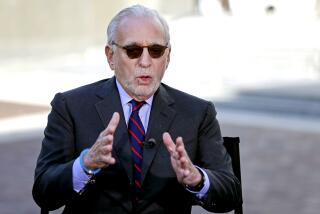Pimco Bond Funds to Regain Control of Name
The Pimco brand name of mutual funds, which was dragged through some mud this year, will get a cleanup with changes to be announced today.
The funds’ parent company has agreed to hand control of the Pimco label back to the firm’s Newport Beach-based bond business after scandals this year that tarnished East Coast-based stock funds marketed under the Pimco brand.
The move is a victory for Bill Gross, the chief investment officer of the $400-billion bond operation and one of the world’s best-known money managers. Gross, who co-founded Pimco 30 years ago, in February demanded a “divorce” from other funds that had been using the Pimco label since German insurance giant Allianz bought control of Pimco in 2000.
Allianz will set that split in motion today when it announces a name change for Allianz Dresdner Asset Management, its umbrella U.S. investment arm, said Joachim Faber, who heads that unit.
![]()
The change, to Allianz Global Investors, will be followed in the first quarter of 2005 by the removal of the Pimco brand name from about two dozen Allianz-owned funds that aren’t managed by Gross’ operation, Faber said in a telephone interview from Munich, where the parent company is headquartered.
He said he agreed with Gross that using the Pimco label -- short for Pacific Investment Management Co. -- as a marketing tool for unrelated funds had in retrospect been a mistake.
Pulling the Pimco name off those funds “is something we should have done earlier,” Faber said.
Gross said Friday that he was happy with the decision.
“Brand confusion doesn’t help investors, employees or anyone else,” he said. “We’re glad to have the Pimco name associated only with the products we lead.”
The branding issue came to a head in February, after New Jersey securities regulators named certain Pimco-label stock and bond funds in a lawsuit alleging improper trading. The funds had permitted “market-timing” trades by a New Jersey-based hedge fund, hurting buy-and-hold shareholders, the suit said.
The case was one of dozens that state and federal regulators filed against fund companies alleging widespread trading abuses, in a scandal exposed by New York Atty. Gen. Eliot Spitzer beginning in September 2003.
The 60-year-old Gross wasn’t implicated in the New Jersey suit. But as the public face of Pimco -- known to financial TV viewers worldwide as a leading authority on fixed-income investments -- he said he took the charges as a personal affront.
Normally soft-spoken, Gross immediately went on the offensive, insisting in full-page newspaper ads and in media interviews that the bond funds had been wrongly named in the suit, had broken no rules, and that they had no connection to the Pimco-label stock funds that were at the heart of the case.
The New York-based stock portfolios had been marketed as the Pimco PEA funds.
“You want to scream and say, ‘No, it’s not Pimco; these are separate subsidiaries owned by our parent. They’re a brother-in-law -- they’re not even a sister,’ ” Gross told The Times in an interview after the lawsuit was filed.
In June, New Jersey dropped its charges against the Pimco bond funds. On the same day, PEA Capital, which managed the stock funds named in the suit, agreed to pay $18 million to settle the case, without admitting or denying wrongdoing.
But the Pimco name continued to appear in other negative headlines through the summer because of two separate investigations of PEA Capital’s operations and the Pimco PEA funds.
One was a Securities and Exchange Commission probe of alleged market-timing abuses at the stock funds. PEA Capital settled that case in September by agreeing to pay $50 million.
A few days later, the company and related marketing units agreed to pay $20.6 million to end a joint investigation by the SEC and California Atty. Gen. Bill Lockyer into so-called revenue-sharing agreements with brokerage firms that sold the funds. Regulators alleged that PEA Capital and its marketing arms had failed to properly disclose sales-incentive payments made to brokerages from 2000 to 2003.
As in the New Jersey case, PEA Capital did not admit or deny wrongdoing in its settlements with the SEC and Lockyer.
The Pimco bond funds weren’t named in either of the cases settled in September.
The bond operation is the crown jewel of Allianz’s U.S. money management business, which has about $500 billion in total assets.
The German company has acquired other mutual fund companies and private money managers in the last decade, including Nicholas-Applegate Capital Management in San Diego and RCM Capital Management in San Francisco.
But the Pimco bond unit was by far the biggest fund purchase. It controls about 80% of Allianz’s U.S. asset total and is considered by many analysts to be the world’s premier bond investor.
“Obviously, the Pimco name gave a larger exposure” to the other Allianz-owned funds, Faber said, explaining the use of the Pimco prefix in branding the much smaller stock funds.
The heft of the bond operation, Gross’ high-profile stature and his track record as one of the fund industry’s top-performing bond managers all but guaranteed that Allianz would accede to his demands to take back the Pimco label, said Roy Weitz, who runs FundAlarm.com, a website that tracks industry trends.
“He could hold their feet to the fire,” Weitz said.
Faber, however, said there was no dispute after Gross raised the issue.
“Bill and I were already in agreement three years ago that it was time to adjust the branding to a new reality,” Faber said. He said both he and Gross were angry with themselves “that we didn’t execute quicker.”
Gross in February said he believed that he shared part of the blame for allowing the Pimco brand name to be used as a wider marketing tool for Allianz.
On Friday, Gross expressed relief that the Pimco name was coming home to stay in Newport Beach.
“From now on,” he said, “ ‘Pimco’ will only mean ‘bonds.’ ”






